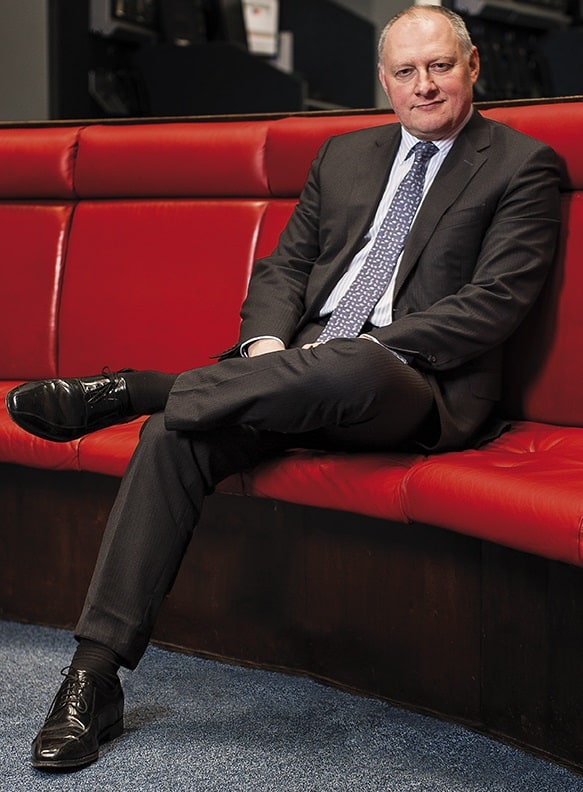In November 2015, Hong Kong Exchanges and Clearing announced that LME Clear chief executive Trevor Spanner was to become chief operating officer from January 2016.
As part of his role, he will also be leading the new Platform Development Division which will have senior responsibilities for project management and IT development.
Spanner joined the London Metal Exchange as head of post trade services back in November 2011 from Euro CCP, the European clearing house of DTCC.
Having played the leading role there in the initial launch of the clearing house, his experience was deployed once more at LME and he became instrumental in the strategic planning of LME Clear ahead of the launch in September 2014.
A year on from the anniversary of Stock Connect and HKEx announced a management shake-up in preparation for the next stage of its development.
Growth in income from the clearing division was one of the big success stories for HKEx over the past year.
According to the company’s most recent results, market activity grew rapidly on cash and derivatives markets in Hong Kong during the third quarter of 2015. The group declared overall growth in revenue and other income of 49% for the nine months to September, compared to the previous year.
The “commercialisation of LME’s trading fees” since the start of the year was another reason given to the success of the business. Against this backdrop, it’s easy to see why Spanner will play a pivotal role.
Strategic development
In advance of Spanner’s move – which will see him become a keen figure in the development of HKEx’s Strategic Plan for 2016 – 2018 – The TRADE Asia, asked the qualified Chartered Accountant what his priorities will be in the early days of the role.
He said: “The first thing is to build the team and to look very closely at the key enablers for future strategy. It’s all around people, systems and processes in the initial phase.”
In its most recent statement to investors, HKEx said it was keen to drive more over-the-counter business to be brought on-exchange. As a result, the LME announced measures to grow options trading, increase data reporting transparency and offer better protection to market participants with large orders.
Spanner says that the group now needs to consider how it can better make use of group assets and infrastructure and look at driving innovation to expand the business in Asia.
He says: “You are looking for innovation and predicting the future, business architecture, the role of new technologies in that framework and getting the right level of investment in your production environment. How much do you spend on existing platforms? …and new platforms? It requires a deep understanding.”
Spanner has been on the management committee for HKEx for some time, so he won’t be going into the new job ‘cold’, but he believes the experience of working with the London exchange team can be easier transferred to Asia.
Among those projects on his ‘to do’ list is looking at business process. He says it has been a long time since the business reviewed its ledger functionality and he also sees potential in improving market connectivity.
His initial recruitment drive is likely to include new staff hires in project management and analytics as well as some specialist subject managers.
Regulatory priorities
Spanner recognises the fact that international regulation has put pressure on banks’ capital requirements but says that this certainly isn’t bad thing for clearing houses as it creates a business opportunity.
He says projects such as LME’s Compression Service means customers require less reconciliation and could, in theory lower their capital requirements under Basel III by using the service.
He believes regulation will continue to be the key driver of innovation over the coming three years.
While European firms wrestle with the fallout from MIFID II, Asian companies are still very focussed on international standards, he says.
Meetings with colleagues in the region are dominated by discussions on anti-money laundering and equivalence between Asia, Europe and the States.
So how does this regulatory agenda play into the strategic plan he has been tasked with drawing up?
He is keen not to front run any ideas up for discussion, but says that HKEx needs to build on its success in linking markets and points to the recently announced plans for a Hong Kong-London Connect.
If the project goes ahead as planned, the link will enable market participants using HKEx services to trade LME products, and HKCC’s eligible clearing participants to clear those trades.
While Spanner admits that development is at a very early stage, he sees this as one of several important opportunities.
He says: “As part of the presidential visit to the UK there was a provisional signing for a London-Hong Kong Connect. HKEx has been successful in linking markets, just look at the Hong Kong Shanghai Stock Connect.
“The geographic position of Hong Kong in Asia means it is uniquely positioned to help China expand internationally and we think we have a lot to do there. International traders who want to go into Asia and China and those on the mainland should be viewing Hong Kong as an important conduit.”
When it announced Spanner’s appointment as the new chief operating officer of HKEx, it was announced that Henry Ingrouille – the current chief operating officer – would be leaving in March, but would be remaining for an interim period to assist with the transition.
